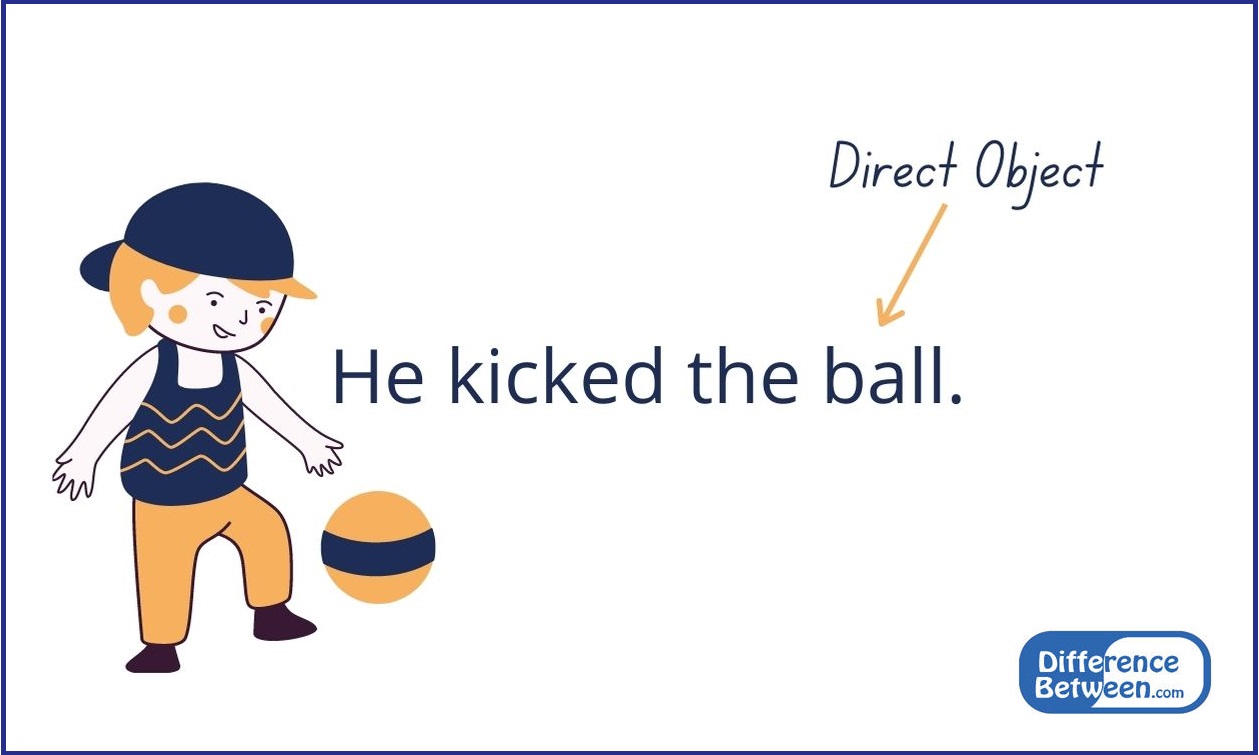Difference Between Predicate Nominative and Direct Object
The key difference between predicate nominative and direct object is their function. A predicate nominative makes the subject and the word (or words) after the given verb in a sentence equal. But, a direct object in a sentence makes the word (or words) after the given verb the receiver of the action (the action performed by the subject).
Predicate nominative and direct object occur in different types of sentences. Direct objects occur in sentences with action verbs, while predicative nominatives always occur in sentences with linking verbs.
CONTENTS
1. Overview and Key Difference
2. What is a Predicate Nominative
3. What is a Direct Object
4. Predicate Nominative vs Direct Object in Tabular Form
5. Summary – Predicate Nominative vs Direct Object
What is a Predicate Nominative?
A predicate nominative, also called a predicate noun, comes after the linking verb. A linking verb is a verb that connects the predicate with the subject of the sentence without providing any action. They identify the subject and only further describes it. Verbs such as am, is, are, was, were, be, seems, and feels are examples of linking verbs. A predicate nominative completes a linking verb and renames the subject. They also give details about the subject of a sentence. If the position of the predicate nominative and the subject is changed or switched, the sentence should still be meaningful.
Generally, a predicate nominative is necessarily equal to the subject in a given sentence.
For example
She is a queen.
The subject, she, is presented as an equivalent to the queen, and both words stand for the same meaning.

What is a Direct Object?
A direct object is a word or a phrase that resembles the receiver of the action of a verb. It makes the word or the words that are after the verb the recipient of the action caused by the subject. Here, the verb used is always an action verb. To find the direct object, you can always ask the questions “whom’ or ‘what.’
Examples
The bus hit the building
The bus hit “whom’ or ‘what’?
The answer is the building. Therefore building is the direct object
The direct object receives the action of the given verb.
For example,
Maria threw a ball.
The ball is the recipient of the action created by Maria.
What is the Difference Between Predicate Nominative and Direct Object?
The key difference between predicate nominative and direct object is that a predicate nominative gives further information, renames the subject, and completes a linking verb. Meanwhile, a direct object is the receiver of the action of a transitive verb. Therefore, generally, a predicate nominative makes the subject and word or words that are after the verb equal. In contrast, the direct object makes the word or words that are after the given verb the recipient of the action caused by the subject.
The following infographic presents the difference between predicate nominative and direct object in tabular form.
Summary – Predicate Nominative vs Direct Object
A predicate nominative succeeds a linking verb. It also renames the subject of the sentence. Subject complements here can be nouns, pronouns, or adjectives. A direct object meantime pursues an action verb and answers the question “Whom?” or “What?” It is always a noun or a pronoun. Thus, this is the key difference between predicate nominative and direct object.
Reference:
1. Nordquist, Richard. “What Are Predicate Nominatives in English Grammar?” ThoughtCo.
2. Shrives, Craig. “What Is a Direct Object? (with Examples).” Grammar Monster.
ncG1vNJzZmivp6x7pbXFn5yrnZ6YsqOx07CcnqZemLyue8OinZ%2Bdopq7pLGMm5ytr5Wau2680Z6bopuRqbJuus6moKeZpJ7DpnnAp5tmnJmnsqTAjKiZo52TqXw%3D